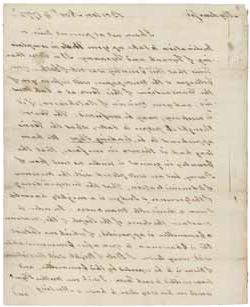Letter from Samuel Adams to James Warren, 4 November 1772
To order an image, navigate to the full
display and click "request this image"
on the blue toolbar.
-
Choose an alternate description of this item written for these projects:
- Main description
[ This description is from the project: Coming of the American Revolution ]
In this letter, Samuel Adams in Boston writes to James Warren in Plymouth, emploring his friend that if the newly established Boston Committee of Correspondence is to succeed, other towns throughout the colony must follow suit and set up their own committees.
A Committee is Born
On 28 October 1772, the Boston selectmen meet to discuss a response to the crown's plan to pay judges' salaries using American customs revenue. The meeting is adjourned until 2 November, at which time the selectmen vote to establish a Committee of Correspondence. The twenty-one men appointed to the committee are a distinguished group. Many have ties to Boston's political institutions, while others are well-established merchants, lawyers, or physicians. Samuel Adams, who had proposed the idea of the committee, is a key member of the organization. He recognizes that if the Committee of Correspondence idea is to succeed, other towns throughout the colony must participate in the endeavor, a concern he shares with his friend in Plymouth, James Warren.
Questions to Consider
1. According to Samuel Adams, what are the "leading steps" taken by the town of Boston?
2. Who is "Patriot Otis"? To what position has he been appointed?
3. Which town does Adams hope will appoint a committee of correspondence next? Why do you think Samuel Adams is particularly interested in this town?
4. Which towns write letters to Boston filled with "manly resentment?" What do you think this phrase means?
5. Why is it important that the committee of correspondence be comprised of prominent men from the community and men with ties to existing political or social organizations?
Further Exploration
6. Review the list of men appointed to the committee of correspondence (Click here to see the list on page 3 of The Votes and Proceedings of the Freeholders and other Inhabitants of the Town of Boston. Do any of the names look familiar to you? Why? Identify at least one person on the list and write a short biographical sketch of that individual. Question?
7. John Hancock and Thomas Cushing declined invitations to become members of the Committee of Correspondence. Why do you think they did so? How might their connections to town politics or economics have influenced their decisions?
8. Imagine that your class has voted to establish a committee of correspondence with other classrooms in your school. How would you go about establishing and publicizing the committee?

